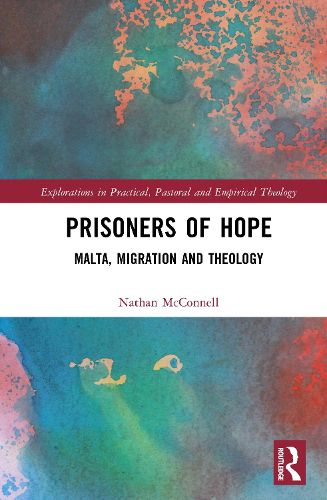Readings Newsletter
Become a Readings Member to make your shopping experience even easier.
Sign in or sign up for free!
You’re not far away from qualifying for FREE standard shipping within Australia
You’ve qualified for FREE standard shipping within Australia
The cart is loading…






Prisoners of Hope focuses on ecclesiological and practical theological responses to migration, asylum-seeking and refugee integration and assimilation. It considers the relationship between the church and the nation-state relative to political asylum by questioning the various responses of Christians who advocate for refugees and asylum-seekers in their spheres of influence. Prisoners of Hope features how the Church might begin to appraise and address the various socio-political strategies employed by nation-states, which situate migrants in a form of 'quasi-political' status as they move from one place to another. It holds key benefits for exploring the philosophical and theological intersections of Dietrich Bonhoeffer, Giorgio Agamben and Seyla Benhabib and those attempting to ask about treatment of the refugee and asylum-seeker. Prisoners of Hope will be of particular interest to those attempting scholarly research in the areas of theology, religion, and migration studies as it investigates the phenomenological experiences of refugees going "in" and "out" of detention as well as arguments relating to porous borders within sovereign national entities. Initially, the book engages definitions of migration, moving onto concepts State of Exception and Homo Sacer, and analysis arguments regarding porous borders and cosmopolitanism. Of specific benefit for Christian theology is the second half of the book, which examines the importance of vicarious witnessing, prayer, voicing inclusion, worshipping communities and the inclusion of the 'other'. Overall, Prisoners of Hope is a pertinent addition to those discussing concepts of national sovereignty, migrant assimilation, asylum-seeking, hospitality, and the juxtapositioning of the foreigner within the often, intricate dialogues associated with political entry.
$9.00 standard shipping within Australia
FREE standard shipping within Australia for orders over $100.00
Express & International shipping calculated at checkout
Prisoners of Hope focuses on ecclesiological and practical theological responses to migration, asylum-seeking and refugee integration and assimilation. It considers the relationship between the church and the nation-state relative to political asylum by questioning the various responses of Christians who advocate for refugees and asylum-seekers in their spheres of influence. Prisoners of Hope features how the Church might begin to appraise and address the various socio-political strategies employed by nation-states, which situate migrants in a form of 'quasi-political' status as they move from one place to another. It holds key benefits for exploring the philosophical and theological intersections of Dietrich Bonhoeffer, Giorgio Agamben and Seyla Benhabib and those attempting to ask about treatment of the refugee and asylum-seeker. Prisoners of Hope will be of particular interest to those attempting scholarly research in the areas of theology, religion, and migration studies as it investigates the phenomenological experiences of refugees going "in" and "out" of detention as well as arguments relating to porous borders within sovereign national entities. Initially, the book engages definitions of migration, moving onto concepts State of Exception and Homo Sacer, and analysis arguments regarding porous borders and cosmopolitanism. Of specific benefit for Christian theology is the second half of the book, which examines the importance of vicarious witnessing, prayer, voicing inclusion, worshipping communities and the inclusion of the 'other'. Overall, Prisoners of Hope is a pertinent addition to those discussing concepts of national sovereignty, migrant assimilation, asylum-seeking, hospitality, and the juxtapositioning of the foreigner within the often, intricate dialogues associated with political entry.